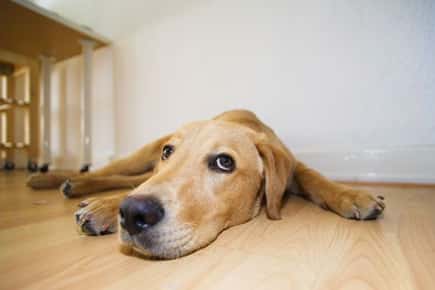
When life gets to be too much to handle, it helps to have a safe place to hide. Create a haven for your dog in a room in your home. Put a few toys and comfortable bedding in the room, and make sure it is always accessible. Add one of your unlaundered shirts. Your dog may take comfort in snuggling against an item that smells like you.
Change Your Habits
Your dog has learned that when you pick up your keys, you are leaving. If simply holding your keys, triggers a reaction, change your behavior -- and his. Pick up the keys, but do not go anywhere. Or slip your keys into your pocket well in advance of your departure. When you depart and arrive, do not make a big fuss over your dog. Wait a few minutes before you greet him. If you do not turn arrivals and departures into dramatic scenes, they may be less traumatic for your pet.
Talk to Your Pet's Veterinarian
Your dog's veterinarian can recommend strategies that can be helpful in overcoming anxiety. If nothing works, he or she may suggest over-the-counter products that may help calm your pet or anti-anxiety medication that will help your furry friend feel more relaxed.
Causes of Anxiety
Dogs can develop anxiety for a variety of reasons, including:
- Fear. Dogs have long memories and they do not forget about the bad experiences they have had. If these experiences occurred before your dog came to live with you, you may never know the cause of the fear. Even a trip to a kennel can provoke long-lasting anxiety in dogs.
- Poor Socialization. Puppies need to be exposed to a range of people and situations to become confident. If your pet did not receive proper socialization during the first months, anxiety may become a chronic problem.
- Aging. Aging causes many changes in your dog's health and behavior. It's not unusual for a previously fearless dog to develop anxiety, particularly if vision loss, dementia or other health issues are a problem.
- Being Trapped. If your dog experienced a stressful situation in the past and could not escape, anxiety may develop when a similar situation occurs. For example, if your dog was confined to a crate when firecrackers went off nearby, you may notice anxiety symptoms when you bring out the crate.
- Disease And Conditions. Viruses that affect your dog's central nervous system can cause permanent damage that may alter your pet's reaction to stressful situations.
- Unknown Causes. You may never know what caused your dog's anxiety. Some breeds of dogs, including poodles, Siberian huskies, Chesapeake Bay retrievers, Great Pyrenees, German shorthaired pointers, border collies and Bernese mountain dogs, are more likely to develop anxiety.
Don't Leave Me!
Separation anxiety is the most common type of anxiety in dogs. Dogs that experience the problem can't stand to be away from family members for even a minute. If you must leave them alone, they tend to become destructive. This behavior is not a way to get back at you for leaving your pet. It's simply the way your pet handles anxiety.
Signs of Anxiety
Your dog may suffer from anxiety if you notice any of the following signs:
- Barking And Howling. Dogs are often very vocal if they feel anxious. Although you may never hear the barking, whining or howling if it occurs when you are away from home, your neighbors might.
- Scratches On Doors And Windows. Your anxious dog will do anything to be reunited with you, including clawing and scratching at the doors and windows in an attempt to escape.
- Potty Accidents. Anxiety can cause your housetrained pet to experience accidents while you are away.
- Ear Position. You may notice that your dog's ears are erect and pressed closer to its head.
- Pulled-Back Lips. Pulled-back lips or a tightly closed mouth can be signs that your dog does not feel calm and relaxed.
- Drooling, Shedding And Trembling. These physical signs are very common if your dog is anxious.
Are you concerned about your dog's anxiety problem? We can help. Call us today to schedule an appointment.
